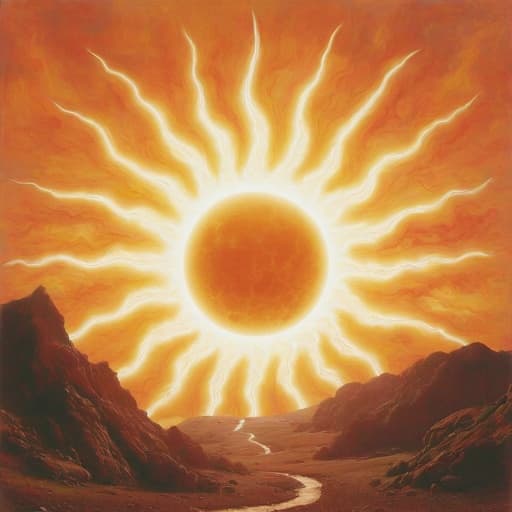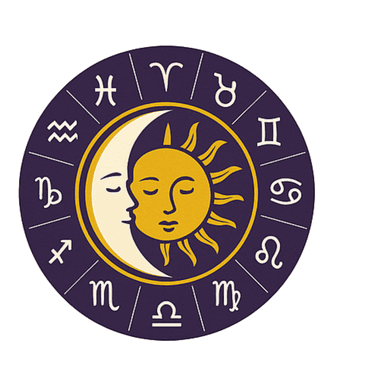Sun in Vedic Astrology: Key to Self, Authority, and Vitality

Sun in Vedic Astrology: Key to Self, Authority, and Vitality
The Sun holds a special place in Vedic astrology. It’s seen as the source of light in the sky, a constant reminder of energy, power, and leadership. In a birth chart, the Sun doesn’t just point out ego or personality; it reveals the core self, the source of confidence, the father’s role, and areas tied to self-expression and recognition. Understanding the Sun’s position helps unlock why a person may stand out, look for praise, or push ahead in life.
The Sun’s Meaning and Symbolism in Vedic Astrology
The Sun, known as Surya in Sanskrit, stands for the Atman or soul. In Vedic thought, the Sun is not just a ball of fire or a distant star. It’s a symbol of the everlasting self and represents the will to live, shine, and take charge. The Sun sits as the king among the nine planets (Navagrahas), ruling over Leo and holding high honor in the zodiac.
A strong Sun points to leadership, recognition, willpower, and vitality. Its energy is constant and direct, not subtle or hidden. Many ancient stories tie the Sun to Surya Deva, the visible god in the sky, who blesses people with health and courage. The Sun’s role in astrology echoes these myths: it gives light, clarity, and focus wherever it stands in a chart.
How the Sun Affects Personalities and Life Areas
The Sun’s place in a birth chart shapes confidence, ambition, sense of self, and ego. Its energy makes a person want to achieve, stand out, or take the lead. When strong, the Sun can give a healthy ego and strong willpower. When weak, the person may struggle with self-esteem or fall into other people’s shadows.
Key life areas influenced by the Sun:
- Health: The Sun rules vitality and basic life force. Weak Sun can mean low energy, poor immunity, or issues with the heart and eyesight.
- Career: The Sun’s energy points to authority, leadership, and the drive to reach high positions. Its strength often shows in managers, government workers, or anyone in the public eye.
- Father figures: In Vedic astrology, the Sun stands for the father or authority in the family. Its condition may reflect relations with the father or male mentors.
- Status and reputation: The Sun asks, “How do you want to be seen?” It governs self-respect, honor, and the wish for public recognition.
Sun in the Twelve Zodiac Signs
The Sun’s impact shifts in each sign, coloring the way a person shines. Here’s a brief look at its core effects:
Sign - Traits When Sun is Here
Aries - Strong will, courage, leadership, quick actions
Taurus - Steady, practical, values comfort, can be stubborn
Gemini - Curious, communicative, witty, scattered focus
Cancer - Caring, protective, values family, emotional
Leo - Confident, creative, loves attention, generous
Virgo - Detail-oriented, analytical, seeks order
Libra - Diplomatic, values fairness, may seek approvalScorpioIntense, secretive, strong-willed, deep emotions
Sagittarius - Optimistic, blunt, adventurous, philosophical
Capricorn - Disciplined, ambitious, practical, focused on results
Aquarius - Independent, idealistic, values freedom
Pisces - Sensitive, empathetic, creative, sometimes escapist
The Sun’s house location points to life themes where its power shows.
- First House: Gives strong self-image, presence, and high energy. People often like to lead.
- Fourth House: Connects to home, mother, roots; gives pride in family. May rule the household or seek comfort.
- Seventh House: Focuses on partners and marriage. Pride comes from relationships. Can look for strong partners.
- Tenth House: The Sun’s best spot for public life and status. Brings leadership, recognition, and success in career.
Each house colors the Sun’s effects, putting the light on specific events and focus points. For example, the Sun in the Tenth House often means high achievement, while in the Seventh it may bring strong needs within partnerships.
The Sun’s Relationships With Other Planets
Planets never act alone. The Sun can team up (conjunction) or interact (aspect) with others, changing its tone.
- With Saturn: Struggles may develop between ego and limits. Can cause power struggles or a cool relationship with authority.
- With Jupiter: Boosts optimism, wisdom, and moral strength.
- With Rahu (North Node): Inflates ego, fuels ambition, but can bring restlessness.
- With Ketu (South Node): Can weaken self-image or create doubts about one’s purpose.
A planet’s company often shifts the Sun’s pure drive into mixed or subtle forms, depending on the blend.
Strength, Weakness, and Remedies for the Sun
Some charts show a powerful Sun; others reveal its struggles. Signs of a strong Sun include leadership, stable health, and solid self-respect. Weak Sun may lead to self-doubt, lack of energy, or struggles with bosses or the father.
Markers of a weak Sun:
- Trouble with authority or discipline
- Low confidence, self-worth issues
- Heart and vision problems
- Hidden or unrecognized talents
- Problems with government or legal matters
Practical remedies in Vedic astrology help balance the Sun’s energy:
- Recite the Gayatri Mantra daily at sunrise
- Wear a Ruby after checking with an expert
- Donate wheat, red clothes, or copper on Sundays
- Spend time in morning sunlight
- Show respect to the father and elders
- Fast on Sundays or offer water to the rising Sun
Consistency with these routines is believed to strengthen weak Sun placements and restore personal power.
Conclusion
The Sun in Vedic astrology does far more than describe character traits. It reveals life’s core, showing where a person stands out, feels pride, or seeks recognition. By studying Sun placement, people can learn how they lead, where they shine, and what holds them back. Reflection on the Sun’s role in your chart is a strong step toward understanding both challenges and strengths. By knowing the Sun’s influence, you get one step closer to knowing yourself and living with clarity and purpose.
